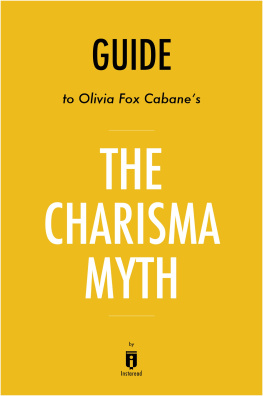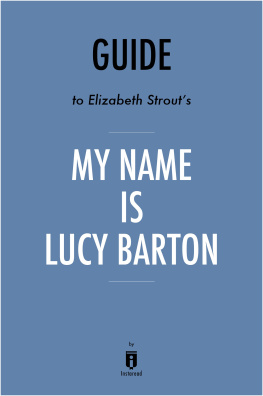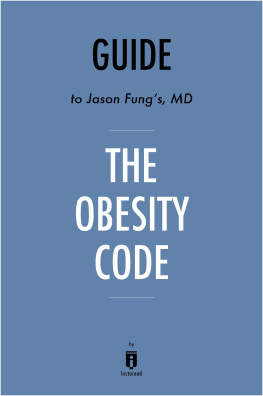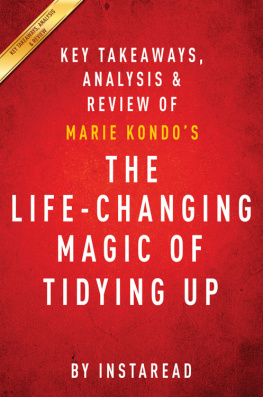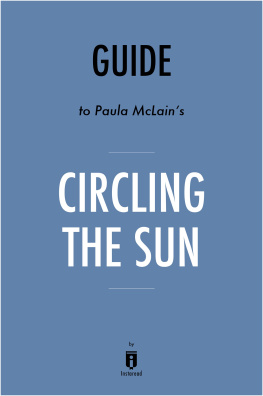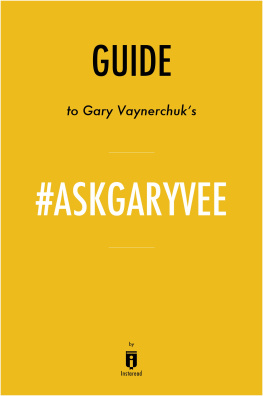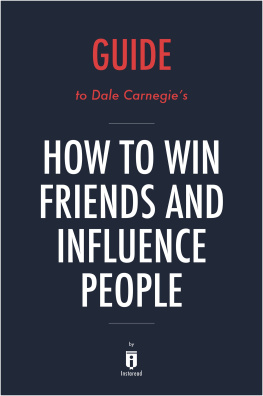. Instaread - Summary of the Charisma Myth: by Olivia Fox Cabane
Here you can read online . Instaread - Summary of the Charisma Myth: by Olivia Fox Cabane full text of the book (entire story) in english for free. Download pdf and epub, get meaning, cover and reviews about this ebook. year: 2016, publisher: iDreamBooks Inc, genre: Politics. Description of the work, (preface) as well as reviews are available. Best literature library LitArk.com created for fans of good reading and offers a wide selection of genres:
Romance novel
Science fiction
Adventure
Detective
Science
History
Home and family
Prose
Art
Politics
Computer
Non-fiction
Religion
Business
Children
Humor
Choose a favorite category and find really read worthwhile books. Enjoy immersion in the world of imagination, feel the emotions of the characters or learn something new for yourself, make an fascinating discovery.
Summary of the Charisma Myth: by Olivia Fox Cabane: summary, description and annotation
We offer to read an annotation, description, summary or preface (depends on what the author of the book "Summary of the Charisma Myth: by Olivia Fox Cabane" wrote himself). If you haven't found the necessary information about the book — write in the comments, we will try to find it.
Inside this Instaread Summary of The Charisma Myth
Overview of the book
Important People
Key Takeaways
Analysis of Key Takeaways
Summary of the Charisma Myth: by Olivia Fox Cabane — read online for free the complete book (whole text) full work
Below is the text of the book, divided by pages. System saving the place of the last page read, allows you to conveniently read the book "Summary of the Charisma Myth: by Olivia Fox Cabane" online for free, without having to search again every time where you left off. Put a bookmark, and you can go to the page where you finished reading at any time.
Font size:
Interval:
Bookmark:
Guide to
Olivia Fox Cabanes
The Charisma Myth
How Anyone Can Master the Art and Science of Personal Magnetism
by
Instaread
Please Note
This is a companion to the original book.
Copyright 2016 by Instaread. All rights reserved worldwide. No part of this publication may be reproduced or transmitted in any form without the prior written consent of the publisher.
Limit of Liability/Disclaimer of Warranty: The publisher and author make no representations or warranties with respect to the accuracy or completeness of these contents and disclaim all warranties such as warranties of fitness for a particular purpose. The author or publisher is not liable for any damages whatsoever. The fact that an individual or organization is referred to in this document as a citation or source of information does not imply that the author or publisher endorses the information that the individual or organization provided. This concise companion is unofficial and is not authorized, approved, licensed, or endorsed by the original books author or publisher.
Table of Contents
The Charisma Myth by Olivia Fox Cabane is a book in the self-help genre that instructs the reader on how to develop and maintain a charismatic persona in business and personal life. The stereotype is that charismatic people are born with this trait and that it cannot be learned. In reality, charisma is a skill that can be developed, turned on and off, and used in different forms depending on what the situation requires.
Charisma is communicated through conversation and body language. It is identified with power, warmth, and presence. Those traits combine to create four different types of charisma: focus, vision, kindness, and authority. Internal obstacles can undermine a charismatic demeanor, and overcoming those obstacles requires resolving physical discomfort, anxiety, and doubt with the use of perspective-shifting exercises.
Uncharismatic people can enhance their personal magnetism by mimicking the body language and conversational habits associated with charismatic people, because the brain can be tricked into behaving with charisma. A few of these behaviors include pausing before answering questions, maintaining eye contact while listening, and taking a wide stance. Charisma can smooth relations with difficult people through compassion and heightened presence, and it can ease the task of delivering bad news or criticism. A charismatic first impression can create long-term benefits due to the approval of others.
There are some drawbacks to having charisma, which include incurring envy from others, or accidentally earning too much trust from others, resulting in embarrassing over-sharing. These drawbacks can be prevented with various strategies.
Olivia Fox Cabane is a corporate consultant who specializes in increasing and managing charisma. She lectures at business schools and is the current director of Innovative Leadership for the StartX program at Stanford University.
Steve Jobs (1955-2011) was the co-founder and chief executive officer of Apple, Inc., and a visionary for the mobile device revolution.
The 14th Dalai Lama is a leading monk of the Gelug school of Tibetan Buddhism. He is well known for advocating for peace and compassion.
Bill Clinton was the 42nd president of the United States. Before that he was governor of Arkansas.
Benjamin Disraeli (1804-1881), 1st Earl of Beaconsfield, served as the prime minister of Britain from 1874 to 1880.
Benjamin Franklin (1706-1790) was a founding father of the United States, a diplomat for the country, its first postmaster general, an inventor, and a philosopher.
Winston Churchill (1874-1965) was prime minister of the United Kingdom during the Second World War.
- C harisma is the ability to attract attention and admiration from others. It is a skill that can be developed, but requires willpower that can be depleted.
- Charismatic people exude presence, warmth, and power. The internal state of mind enables body language to communicate these traits to others.
- Pretending to have charisma achieves equal effects as having it.
- Anxiety, self-doubt, and discomfort can undermine charisma through other types of body language. Methods of reducing this tendency include exercises that change internal perceptions of responsibility and reality.
- A mental outlook conducive to conveying charisma can be practiced, cultivated, and reinforced.
- The four most significant types of charisma are focus charisma, visionary charisma, kindness charisma, and authority charisma. They each create different reactions in others and require different cues to utilize.
- Charismatic first impressions can lead to long-term impressions of trustworthiness and effectiveness.
- Conveying charisma in a conversation involves more listening than speaking.
- Charismatic behaviors can smooth unpleasant conversations and interactions with difficult people.
- Strategies for creating a charismatic presentation include encouraging the audience to ask questions, dressing comfortably, rehearsing, maintaining a powerful stance, projecting warm compassion, breathing comfortably, and slowing down.
- To use charisma in a crisis, people should remain calm, describe the high standards to which they will be holding others and their confidence that they will succeed, express a clear vision for the future, and act without hesitation.
- Exhibiting charisma can lead to drawbacks when others place too much trust in the charismatic person.
Charisma is the ability to attract attention and admiration from others. It is a skill that can be developed, but requires willpower that can be depleted.
Analysis
Charismatic people exhibit personal magnetism, are well liked, can achieve more in negotiations, and find it easier to sway others to their side of a debate. People are more likely to follow a charismatic individual and accept his or her vision for themselves. Charisma can be learned, and turned on or off as needed, although it requires willpower to activate and can be especially difficult for introverts.
Charismatic people from history are unlikely to have received a formal education in how to be charismatic, and in many cases they include people who received less formal education than other equally or less charismatic people. For example, Malcolm X, one of the most influential civil rights leaders of the 1950s and 60s and the leader of the Nation of Islam, dropped out of formal education in middle school when a teacher told him that his goal of going to law school was unrealistic. In contrast to people such as Winston Churchill, who were charismatic but received a long and character-building education, Malcolm X learned about charisma from other charismatic people he met. Using these skills, he led thousands in resistance to repressive policies and left a lasting impact on the civil rights community and the way the world views the Muslim community. [1]
Charismatic people exude presence, warmth, and power. The internal state of mind enables body language to communicate these traits to others.
Analysis
The three factors that make up charisma are complete presence in the current interaction, compassionate warmth toward others, and the impression of having a lot of power to make things happen. Individuals with charisma must feel these traits internally to use them convincingly.
The people that a charismatic person meets might not know that charisma is affecting their first impressions or willingness to negotiate, but they could read these traits as a way to determine with whom they will form alliances. A person with power, and the generosity to use it for others, would be an ideal friend to have in business and personal life, so logically people respond with a desire to please the people who appear to be generous with their power.
Next pageFont size:
Interval:
Bookmark:
Similar books «Summary of the Charisma Myth: by Olivia Fox Cabane»
Look at similar books to Summary of the Charisma Myth: by Olivia Fox Cabane. We have selected literature similar in name and meaning in the hope of providing readers with more options to find new, interesting, not yet read works.
Discussion, reviews of the book Summary of the Charisma Myth: by Olivia Fox Cabane and just readers' own opinions. Leave your comments, write what you think about the work, its meaning or the main characters. Specify what exactly you liked and what you didn't like, and why you think so.

